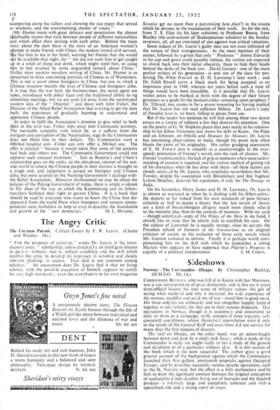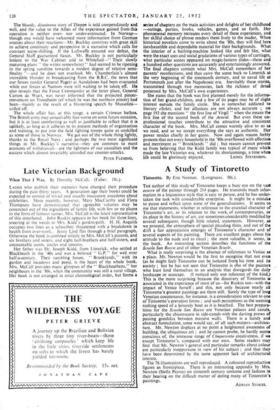Sideshows
CHRISTOPHER BUCKLEY, who was killed in Korea with Ian Morrison, was a war correspondent of great distinction, and in this (as it were) demi-official history his sure sense of m;litary values—his gift Of seeing what mattered and why it mattered, his wide experience of the stresses, muddles and accid :nts of war—stood him in good stead. His three subjects are arbitrarily and not altogether happily lumped together in one volume,,for they are in their natures disparate. Our operations in Norway; -though it is customary and convenient to refer to them as a campaign, really comprised three separate, self- contained eXpeditions, whose the.oreticel interrelation exist-ad only in the minds of the General Staff and even there d:d not survive for many days the first impacts of disaster. The raid on Dieppe, on the .other hand, was an action fought between dawn and dusk by a single task force ; while a study of the Commandos is really (or ought really to be) a study of the. growth and developm-nt of a particular military idea. It is this section of the book which is the least successful The author gives a good general account of the background againstewhich the Commandos launched their first gallant, amateurish pinpricks against Occupied Europe, and he describes succinctly various specific operations, such as the St. Nazaire raid; but the effect is a little perfunctory and he fails to draw the significant contrast between the original conception of undisaiplincd individualists living out of barracks and the finished product—a relatively large and completely coherent unit with a specialised role and a strong esprit de corps. The bloody, disastrous story of Dieppe is told compendiously and well, and the value to the Allies of the experience gained from this operation is neither over- nor under-estimated: In Norway— though one would have welcomed more information from German sources about their reactions—Mr. Buckley contrives with great skill to achieve continuity and perspective in a narrative which calls for constant scene-shifting. If the Luftwaffe ensured our defeat, the General Staff guaranteed fiasco. Mr. Buckley is not particularly, lenient to the War Cabinet and to Whitehall—" Their slowly maturing plans " (he writes somewhere) " had seemed to be ripening in the spring sunshine towards a modest degree of relative semi- finality "—and he does not overlook Mr. Chamberlain's almost incredible blunder in broadcasting from the B.B.C. the news that our forces (under General Paget) at Aandalsnes had been evacuated while our forces at Namsos were still waiting to be takerk off. He also reveals that the Force Commander at the latter place, General Carton de Wiart, was never informed that the projected pincer- movement on Trondheim (of which he was the northern pincer) had been—mainly as the result of a blustering speech by Mussolini— called off.
The whole affair has, at this range, a certain Crimean bathos. The British army may conceivably fare worse on some future occasion, but it is at least comforting as well as justifiable to reflect that it is uplikely, as long as it adheres to its present methods of organisation and training, to put into the field fighting troops quite as unskilled as some of those in Norway. We got out of the whole thing lightly, thanks to the Royal Navy ; and perhaps the two most significant things in Mr. Buckley's narrative—they are common to most accounts of withdrawals—are the lightness of our casualties and the success which almost invariably attended our counter-attacks.
PETER FLEMING.



































 Previous page
Previous page